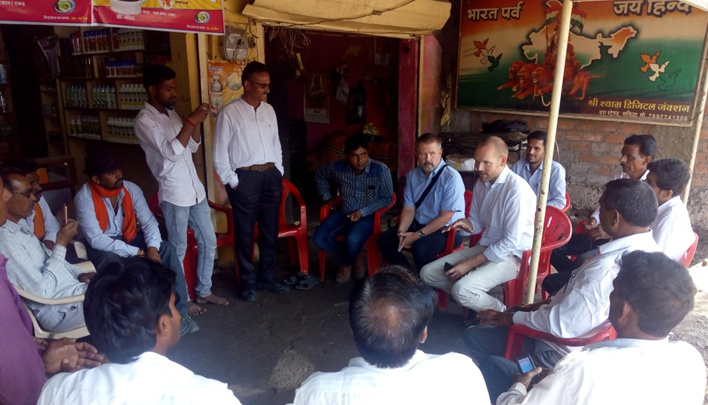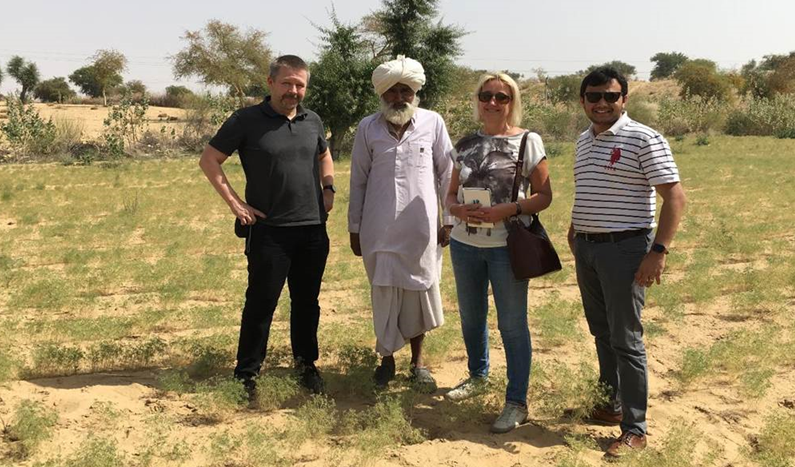India is a major supplier of many raw materials used in Paulig Foods division’s products including black pepper, chili, onion and garlic. The division has collaborated for years with two Indian suppliers, Jain and Jayanti and the results of the collaboration are remarkable in terms of sustainability, profitability and quality improvements.
Jain is a major supplier of onion and garlic for Paulig Foods division, including the Santa Maria brand. Jain’s corporate mission is to “Leave this world better than you found it” and that is strongly aligned with Paulig’s values and way of working.
Typically, the onion supplied by Jain is grown in very small family farms. Jain has established a standard for sustainable agriculture practices called Jain GAP which has been developed according to the needs of small-scale farming.
Improved yields and profitability through sustainable farming practices
In 2012 Santa Maria joined the Jain GAP for onion. At the moment 400 farmers are involved and they gain many benefits from the standard.
- One of the key things is that the farmers receive training on sustainable farming practices in order to increase their yields and profitability. At the same time environmental impacts and health&safety risks are reduced, describes David Kardemark, who is in charge of sourcing raw and pack material for Paulig Foods.
For onion and also other crops they work with contract farms which means that Jain’s agronomists support the farmers in their daily work and the implementation of Jain GAP. The contract farmers are also assured a buy back at guaranteed price on market price, depending on which is higher. All onions delivered to Santa Maria from Jain come from these contract farms.
As a result of the program, we are able to gain full traceability of the raw material.
- When it comes to our products, we are not competing with price. For us, traceability and for example paying the farmers a fair wage are very important things, Kardemark emphasizes.
In 2018 Paulig Food took initiative to start up Jain GAP program for garlic. Today 300 farmers are connected with the aim to have 400 farmers connected by 2020.

Peter and David in meetings with farmers connected to Jain GAP
Jayanti is a supplier from whom we are buying many raw materials, black pepper and cumin are some of these. For cumin they work with 140 contracted farmers in order to secure high quality and sustainability of the farming. At the same time we are also securing that the raw material is gluten free.
For black pepper Jayanti and Paulig Foods have been working with farmers in a certain area in Karnataka for many years. In this way we have the full traceability and we know that the quality is what we require.
- When Paulig Foods switched to buy cumin from Syria to India due to the political reasons in Syria, we wanted to make sure that we are maintaining the taste. But we also wanted the cumin to be produced in a sustainable and food safe way. We wanted a gluten free cumin and to improve the life conditions for the farmers., describes Peter Linell, sourcing manager for cumin.
- In cooperation with Jayanti we started a project in Rajastan in northern India. One of the farmers joining the program, Ali Kahn, use to have no steady income and lived in a shed prior to joining the project. He made his living from various day to day work. Through the program he got training and the needed equipment to start growing cumin in a sustainable and profitable way. Today he has a steady income, lives in a proper house and is able to provide for his family.

Meeting with farmer Ali Kahn at his cumin field
Collaboration and dialogue are the key
According to Kardemark, it is very important to visit the suppliers and farmers to enhance collaboration and dialogue.
- It is key to get a face to the people you are working with. Therefor the sourcing managers are recurrently visiting the farmers. Through close cooperation with suppliers and farmers we see opportunities to start similar programs for other raw material like turmeric, sesame seed, chili and fenugreek. Our aim is that all our raw materials sourced in India should be part of a sustainability program.